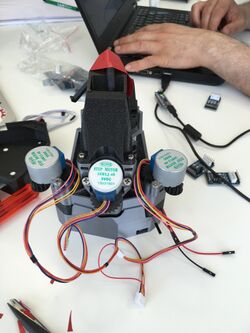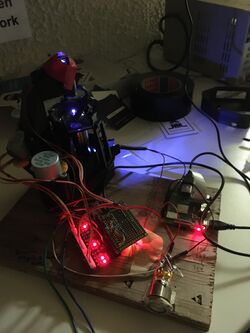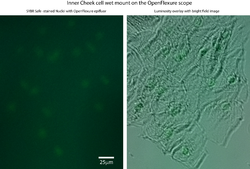Difference between revisions of "OpenFlexure Scope"
| Line 16: | Line 16: | ||
Much more will come soon, we thought, before we we struck by the SARS-CoV-2 pandemic, including the full configuration so far... <br> | Much more will come soon, we thought, before we we struck by the SARS-CoV-2 pandemic, including the full configuration so far... <br> | ||
(thanks to the [www.openflexure.org OpenFlexure] crew at Bath, UK (and elsewhere!), and to all Octanis members, and Masoud for getting the motors to work!!)<br> | (thanks to the [www.openflexure.org OpenFlexure] crew at Bath, UK (and elsewhere!), and to all Octanis members, and Masoud for getting the motors to work!!)<br> | ||
| − | The latest plan | + | The latest plan, as we are finally seeing the light at the end of the tunnel out of this pandemic time (April 2021), will be to try the more sensitive Raspberry Pi camera and the more stable filter insertion version of OpenFlexure, to see if we can also visualise the comet tails... Then, the 'cheek cell chip' might get incorporated into the slide holder, and all our hopes will finally get tested for DNA damage quantitation by both the micronuclei and comets from the same cells! |
Revision as of 09:34, 16 April 2021
Our first real build of an OpenFlexure Scope happened quite some time ago (23may19)!
more to come!
Following instructions from GitHub
Actuator Assembly
Used WD40 to oil the screws before twisting down.
Used Blue LED below, with 150ohm resister to start (maybe not best?)
Used longer screws (15mm) to attach the motors.
The program openflexure ev is put into the fedora system of the 'inner sanctum' space.
login with pi@openflexture.local (and pass from our dear old mascot! )
The motor board was set up by Masoud and running already by December 2019,
but we are not yet able to take overall panoramas of samples.
Figured out exactly how to wire things up, so could do bright field or epifluor.
However, to date (dec2019), we have only been able to image nuclei stained with sybr safe, not yet comets...
Much more will come soon, we thought, before we we struck by the SARS-CoV-2 pandemic, including the full configuration so far...
(thanks to the [www.openflexure.org OpenFlexure] crew at Bath, UK (and elsewhere!), and to all Octanis members, and Masoud for getting the motors to work!!)
The latest plan, as we are finally seeing the light at the end of the tunnel out of this pandemic time (April 2021), will be to try the more sensitive Raspberry Pi camera and the more stable filter insertion version of OpenFlexure, to see if we can also visualise the comet tails... Then, the 'cheek cell chip' might get incorporated into the slide holder, and all our hopes will finally get tested for DNA damage quantitation by both the micronuclei and comets from the same cells!


